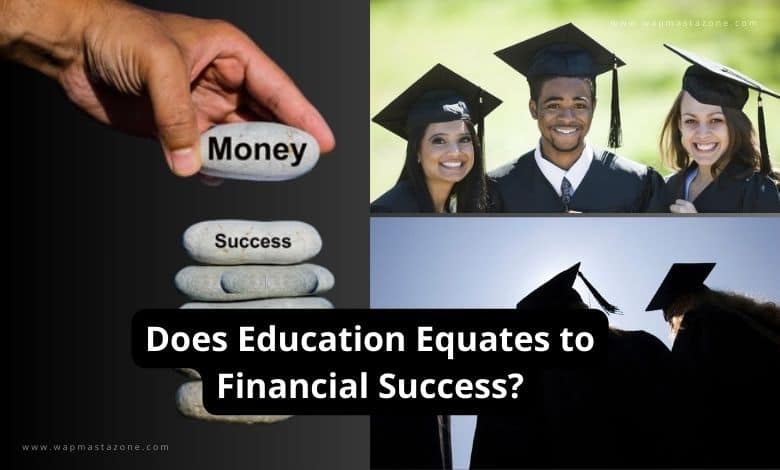
Not long ago, I asked myself if Education equates to Financial Success, this thought drove me to write this article where I argued for and against the topic. For centuries, the pursuit of education has long been heralded as a key to unlocking doors of opportunity, with the implicit promise that it leads to financial success. However, as societal structures evolve and economic landscapes shift, the correlation between education and financial prosperity is becoming increasingly nuanced.
So relax and enjoy this article. I examine extensively both the arguments for and against the idea that education is a direct path to financial success.
The Case For Education As a Path to Financial Success
1. Skill Acquisition and Employability:
One of the fundamental arguments in favor of education as a conduit to financial success is the acquisition of skills. Formal education systems are designed not only to impart knowledge but also to equip individuals with a diverse set of skills. These skills, ranging from critical thinking to technical expertise, are often sought after by employers. In the evolving job market, where automation is reshaping industries, possessing relevant skills can enhance employability and pave the way for financial stability.
2. Network Building and Social Capital:
Education provides a unique environment for networking and building social capital. From classrooms to university events, individuals have the opportunity to connect with peers, professors, and industry professionals. Building meaningful connections can prove invaluable in the professional world, opening doors to job opportunities, mentorship, and collaborative ventures. The social capital accrued through education can significantly impact one’s financial trajectory, with access to a robust network often translating to increased prospects for success.
Related: AI and Human Intelligence – For and Against AI Taking Human Jobs
Read also: Digital Real Estate – The Case For Domain Name Profitability
3. Credentials and Marketability:
Credentials, such as degrees and certifications, act as tangible evidence of educational attainment. In many professions, these credentials are prerequisites for entry, and they can enhance an individual’s marketability. Employers frequently use educational qualifications as a benchmark for assessing competence and commitment. A well-rounded education, backed by recognized credentials, can elevate an individual’s standing in the job market, potentially leading to better-paying opportunities and long-term financial success.
4. Entrepreneurial Advantage:
Education can provide a solid foundation for entrepreneurial endeavors. While not every successful entrepreneur follows a traditional educational path, many benefit from the knowledge and skills acquired through formal education. Understanding market dynamics, financial management, and strategic planning are integral aspects of entrepreneurship, and education can provide the necessary tools for navigating the complexities of running a business. In this sense, education can be a catalyst for financial success in the realm of entrepreneurship.
The Case Against Education as a Path to Financial Success
1. Rising Costs and Student Debt:
One of the foremost arguments against the direct correlation between education and financial success is the escalating cost of education. As tuition fees skyrocket and student loan debt reaches unprecedented levels, the economic burden of obtaining a degree is a significant deterrent. Many graduates enter the workforce burdened by substantial debt, diminishing the immediate financial benefits of their education. In such cases, the correlation between educational attainment and financial success becomes more tenuous.
2. Changing Nature of Work:
The nature of work is evolving, and traditional metrics of success may no longer align with the contemporary job market. The rise of gig economy jobs, remote work, and the emphasis on skills over degrees in certain industries challenge the notion that a formal education is the sole determinant of financial success. In fields like technology and the creative arts, employers often prioritize demonstrated skills and experience over formal qualifications, creating a landscape where success is less contingent on traditional educational paths.
3. Mismatch of Skills and Job Market Needs:
Critics argue that the traditional education system is not always aligned with the dynamic needs of the job market. The rapid pace of technological advancements often renders certain skills obsolete and necessitates the rapid acquisition of new ones. Critics of the education-financial success correlation posit that the rigid structure of formal education systems may hinder adaptability, leaving graduates with degrees that do not necessarily translate into in-demand skills, thereby limiting their financial potential.
4. Success Stories of Non-Traditional Paths
The success stories of individuals who have eschewed formal education in favor of alternative paths challenge the conventional wisdom that a degree is a prerequisite for financial success. Entrepreneurs, innovators, and artists who have achieved significant financial prosperity without following traditional educational routes are frequently cited as evidence that success can be attained through unconventional means. The democratization of information and resources through the Internet has also contributed to the viability of non-traditional paths.
Also read: 10 Types of Business Insurance
Read also: Maximizing Your Startup’s Potential with a Premium Domain Name
Related: Reasons Why you Need Pinterest For Business Promotion
The Intersection of Education and Financial Success

The relationship between education and financial success is undeniably complex, and a nuanced perspective that considers both sides of the argument is essential. While education can undoubtedly provide a foundation for success, its role is evolving in response to societal shifts. Here are some key considerations to the intersection of education and financial success:
1. Holistic Education and Lifelong Learning:
Rather than viewing education as a one-time transaction that guarantees financial success, a more holistic perspective emphasizes the importance of continuous learning. Lifelong learning, both formal and informal, allows individuals to adapt to changing market demands and acquire new skills throughout their careers. This approach recognizes that education is not a static achievement but an ongoing process that contributes to long-term financial resilience.
2. Emphasis on Skills Development:
Since the job market is frequently changing, the emphasis on skills development becomes paramount. Educational institutions and individuals alike should prioritize fostering a diverse skill set that extends beyond academic knowledge. Skills such as adaptability, creativity, and emotional intelligence are increasingly valued by employers and contribute to success in a variety of professional settings.
3. Strategic Education Choices:
The importance of strategic education choices cannot be overstated. Individuals must carefully consider the relevance and applicability of their chosen field of study to the current and future job market. Aligning educational pursuits with emerging trends and industry demands enhances the likelihood of securing financially rewarding opportunities upon graduation.
4. Financial Literacy as a Companion to Education:
Financial literacy is a critical companion to education on the journey to financial success. Understanding personal finance, investments, and wealth management empowers individuals to make informed decisions about their financial future. Integrating financial literacy into educational curricula and personal development initiatives equips individuals with the knowledge and skills needed to navigate the complexities of the financial landscape.
Recommended: Top 10 Tips on How to Identify Phishing Emails and Links
Suggested read: 13 Types of Hackers and How to Prevent Hacking
My Final Thoughts
Looking at the relationship between education and financial success, there is no one-size-fits-all answer. The relationship is influenced by a myriad of factors, including economic conditions, technological advancements, and individual choices. And while education undeniably plays an important role in shaping career trajectories and opening doors of opportunity, it is not the sole determinant of financial success. Ultimately, the equation between education and financial prosperity is dynamic, subject to the ebb and flow of societal and economic currents.



